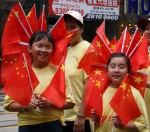A Chinese national studying law in the United States recently wrote an essay about affirmative action that was published on Foreign Affairs, bombastically titled “I’m Chinese, and I Know Why There Aren’t More Asians in the Ivy League.”
I thought this was a little weird. Why would a Chinese national write about a domestic policy issue? I don’t write about Chinese policy issues while explicitly invoking my American identity.
As it turns out, Tianpu Zhang’s article was nothing special. Riddled with generalizations and misconceptions about race and American history, affirmative action opposition isn’t his real point, as his essay’s Chinese title is “Getting into top colleges tough in China, but even tougher in America?!” Zhang’s problem is not minority rights per se, but the perceived lack of recognition of academic and intellectual superiority of Asians.
Zhang opens his essay with the case study of Zili Wang, a model Chinese American student, to make his case. Wang recently criticized affirmative action because he was rejected from schools like “HYP” – Harvard, Yale, Princeton – and believed this was indicative of systematic racial discrimination against Asians in the Ivy League. Never mind the fact that he attends Williams College, the top liberal arts college in the country.
Do not mistake Zhang’s inclusion of Wang’s story as an indication that the former is speaking for Chinese Americans. Chinese American immigration history is lengthy and complex, and there is incredible generational, regional and cultural diversity among us. Zhang’s position as a young, educated Chinese national reflects contemporary mainland Chinese politics and policies – not of the multifaceted and complex Chinese American community I belong to.
Zhang’s essay stands out for representing a growing population of intelligent Chinese abroad in the post-reform era who surreptitiously advance the mainland government’s attitudes and viewpoints on the world – whether they realize it or not. This is concerning, because although Chinese Americans like myself look like Chinese nationals like Zhang, Americans fail to draw these distinctions due to a poor understanding of contemporary immigration and diasporic cultures.
These are not my original ideas. A pioneering Asian American scholar laid out the idea decades ago, when Ling-chi Wang reflected on a classic dilemma Chinese Americans face: being pressured by white American society to assimilate, while feeling compelled to display unbridled loyalty to Chinese government, culture and civilization, even if they desire neither. And the continuing flow of Chinese to America – including those choosing to resettle, but especially Chinese students who see themselves as much more Chinese than American – dramatically complicates the landscape of Chinese in America and leads to massive confusion among the general public as to who is the real voice of the group. For those in the United States, one’s degree of Chinese nationalism is a facet of identity shaped by individual choice and upbringing.
As a result, we have been subject to excessive scrutiny for allegedly acting in line with these notions of Chinese global domination. During the 1996 presidential election cycle, American assumptions of Asian American political apathy were quickly shattered when a series of investigations, collectively titled the “Asian Connection,” were mounted against Chinese and Taiwanese nationals and Americans for soft money contributions to the Clinton campaign and Democratic Party. While some of the contributions were indeed illegitimate, the vast majority were perfectly legal. As UC Hastings Dean Frank Wu notes, the overreaction happened because the donors in question were Asian Americans who behaved like any other interest group – in their case, greater recognition of Asian political participation and immigration reform – but were singled out because of creeping implications that they were in cahoots with China and not real Americans.
Wang’s argument remains surprisingly relevant in understanding contemporary Chinese youth attitudes. One of Zhang’s most telling assertions arrives near the end of the piece, where he declares that “Asians will sooner or later stop being ‘quasi white’ and instead become the cultural ‘whites.’” He also claims that “Asians have already mostly drawn even with white people, even surpassed them.”
These statements are not about achieving parity or social equality. They are about Asian supremacy, derived from perceived grievances that white Americans are unprepared to accept a seemingly inevitable Chinese cultural takeover of the world.
The development of these attitudes is no accident. After the 1989 Tiananmen Square protest and massacre, the communist government created the “patriotic education campaign,” a concerted effort to shape a generation of Chinese more concerned about restoring Chinese civilization to its former glory than asking pointed questions about political reform. It’s no surprise that Zhang’s other claim to fame is a 2013 rant railing against Vice President Joe Biden’s supposed misuse of the term “nation” to describe China. His criticism was an off-the-mark overreaction that reveals the depth of his Chinese national pride.
The Chinese government has cultivated a generation of youth to buy into a notion of Chinese exceptionalism – a mirror image of the American original which appears counter-hegemonic but is really about replacing white supremacy with Asian supremacy. Asian supremacy can be considered a proxy for Chinese supremacy, given its historical position as the political and cultural center of East Asia.
The takeaway here is that some of today’s young Chinese think and feel very differently from young Chinese Americans. Instilled with a strong sense of national pride, cultural righteousness and knowledge, Chinese nationals are asserting themselves as small pieces in the country’s modern rise to power. This pride is a different form from the sort cultivated by individuals unexposed to Chinese education like myself, or longtime Chinese Americans who have no obligations to express loyalty to a government they hardly know.
It is okay to be a proud Chinese. I certainly am one. But asserting that all who are not Chinese should feel like lesser people is simply dangerous.

Excellent writing, Arthur. One of the most enlightening pieces I’ve read on the DB.